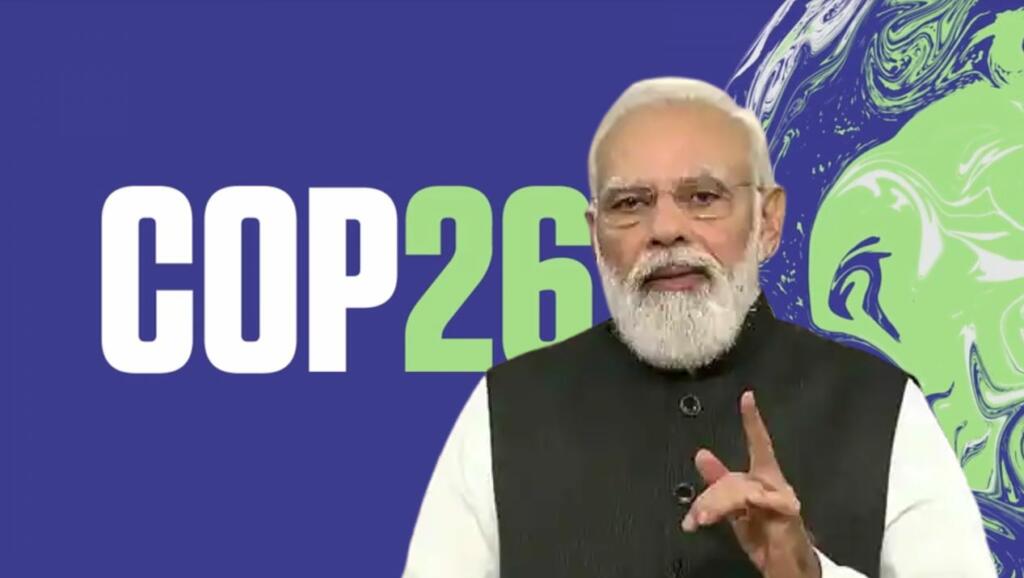- The eco-fascists wanted India to make a submission to UNFCCC to become a carbon-neutral country by 2050, like the western developed nations.
- In Glasgow, while PM Modi made a net-zero pledge, at the same time he reminded the western nations of their responsibility.
- The Modi government has shown that India would pursue the global agenda, as and when they suit its interest.
Since the Modi government came to power, Indian policy on every aspect has been driven solely by national interest. Be it foreign policy, environmental policy, economic policy, or in any other domain, the government has shunned the ideological cliche of left and right, and kept national interest above everything else.
Prime Minister Narendra Modi’s recent pledge of carbon neutrality by 2070 at COP-26, including reducing emissions to 50% by 2030, is also driven by national interest. The eco-fascists wanted India to make a submission to United Nations Framework Convention on Climate Change (UNFCCC) to become a carbon-neutral country by 2050, like the western developed nations.
For the last few years, the western nations are making pressure on newly industrialized countries (NIC) like China, India, Brazil to make a commitment, but India maintained that most of the responsibility for course correction on carbon emission lies with developed countries. The per capita carbon emission in India is extremely low as compared to western countries even now, and historically too, India is arguably the least responsible for global environmental degradation, despite having a quarter of the world’s population.
In Glasgow, while PM Modi made a net-zero pledge, at the same time he reminded the western nations of their responsibility. “It is India’s expectation that the world’s developed nations make $1 trillion available as climate finance as soon as possible”, Modi said. “Justice would demand that those nations that have not kept their climate commitments should be pressured… climate finance cannot lag climate action”.
Also read: India leaves behind US, China and Russia in achieving the Paris climate change goal
Having a net-zero pledge is now in India’s interest, given the fact that the country is a leading producer of renewable energy. Making a push towards renewables will not only reduce India’s import bill on fossil fuels (above 100 billion dollars per annum), but also incentivize the Indian companies to pursue the global market. Two of India’s largest conglomerates, Reliance Industries Limited and Adani Group, are making huge investments in renewable energy. Many smaller companies are also entering the technology side of renewables, and this has enabled the country to not deliver on Paris Climate Agreement, but surpass it.
Thus, Indian interest lies in pursuing renewable energy goals. In terms of economy, it will establish Indian companies among the global leaders of renewable energy and in terms of global affairs, it will heighten the moral standing of the country among the league of the nations. Previously, India had shown the mirror to nations around the world by highlighting the fact that India is the only G20 nation well on track to achieve the goals mentioned under the Paris Agreement.
The Modi government’s focus on renewable sources of energy has certainly yielded results, as India’s solar capacity currently stands at nearly 30 GW, up from 2.6 GW in 2014 and in the same period, wind capacity has shot up to over 36 GW from 21 GW.
Also read: Western nations harassed India over climate change. PM Modi’s bold demand has shut them down
The Modi government’s push for enhancing India’s renewable energy capacity has not escaped the eyes of the investors, who have made huge investments in the sector. The total investment in clean energy is estimated at 11.1 billion dollars for the calendar year 2018, according to data from the Ministry of Renewable Energy and consultancy firm KPMG.
Despite being a developing nation with a major part of the population yet to benefit from the industrial revolution or lack thereof, India has managed to keep its emissions in check.
Under the Paris agreement, the goal is to limit global warming to well below 2, preferably to 1.5 degrees celsius, compared to pre-industrial levels. And India under PM Modi, for the first time has been ranked amongst the top 10 countries in the climate change performance index.
By pledging to climate change goals now, the Modi government has shown that India would pursue the global agenda, as and when they suit its interest.
